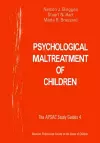
Psychological Maltreatment of Children
3 authors - Paperback
£133.00
Bonnie Kaul Nastasi, Ph.D., (Kent State University, 1986, School Psychology & Early Childhood Education)is a Professor in the Department of Psychology, School of Science and Engineering, at Tulane University. Dr. Nastasi co-directs a trauma specialization in the School Psychology PhD Program at Tulane. Dr. Nastasi’s research focuses on the use of mixed methods designs to develop and evaluate culturally appropriate assessment and intervention approaches for promoting mental health and reducing health risks such as sexually transmitted infections (STIs) and HIV, both within the US and internationally. She has worked in Sri Lanka since 1995 on development of school-based programs to promote psychological well-being and directed a multi-country study of psychological well-being of children and adolescents with research partners in 12 countries from 2008-2013. She was one of the principal investigators of an interdisciplinary public health research program to prevent STIs among married men and women living in the slums of Mumbai, India from 2002-2013. She is active in promotion of child rights and social justice within the profession of school psychology and has directed the development of a curriculum for training school psychologists internationally on child rights, a joint effort of International School Psychology Association (ISPA), International Institute of Child Rights & Development (IICRD), School Psychology Division (16) of the American Psychological Association (APA), Tulane University’s School Psychology Program, and Cleveland State University’s School Psychology Program. She is past president of Division 16 and past co-chair of APA’s Committee for International Relations in Psychology (CIRP). Currently, Dr. Nastasi is APA Council Representative for Division 16 and Past-President of ISPA. She is a Fellow of APA Divisions 16 (School) and 52 (International). Dr. Nastasi received the 2019 Senior Scientist Award from APA’s Division 16.
Stuart N. Hart, Ph.D., is Principal of Strategic Initiatives at the International Institute for Child Rights and Development (IICRD; BC, Canada), Professor Emeritus, School of Education, Indiana University-Purdue University-Indianapolis, a licensed health provider psychologist, and American Psychological Association Fellow. He has worked in higher education, public and private schools, a children’s hospital, a correctional institution, government, and private practice. He has been president of the International School Psychology Association, National Association of School Psychologists (USA), National Committee for the Rights of the Child (USA), and the Indiana Psychological Association. He co-directs Child Rights Education for Professionals of IICRD. He was a member of the NGO Advisory Committee for the UN Secretary-General’s Study on Violence Against Children, co-chaired the drafting committee for the UN’s General Comment 13, The Right of the Child to Freedom from all forms of Violence, and was co-chair of the Secretariat of the Global Network of Research and Development Institutions serving the UN Committee on the Rights of the Child in advancing accountability to the UN Convention on the Rights of the Child. He co-directed the NCCAN/HHS project to develop operational definitions of emotional abuse, first international conference on the topic (1983), and 23 nation research to determine children’s/child caretakers’ perspectives on existing and desired status of children’s rights (1989-2001). He was editor and a contributor to the UNESCO publication: Eliminating corporal punishment: The way forward to constructive child discipline. He has conducted research, presented, educated, and published extensively on psychological maltreatment of children and on children’s rights.
Shereen C. Naser, Ph.D., is an Assistant Professor of School Psychology at Cleveland State University. She received her PhD in School Psychology from Tulane University. Her research and teaching revolve around understanding how school structures, including school responses to student behavior, impact student school engagement and student outcomes. Dr. Naser’s work specifically asks these questions as they relate to historically marginalized youth in U.S. schools including Arab youth and forcibly displaced youth.